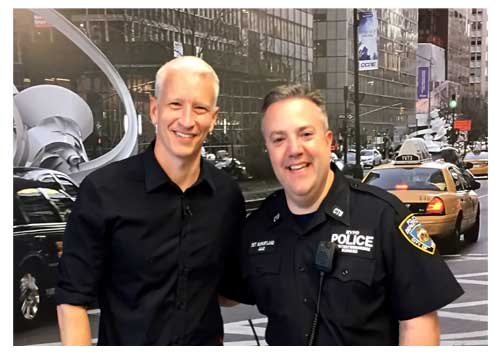When Detective Ray McPartland ’97 chose criminal justice as his major, counterterrorism wasn’t even on the radar in the field, nor were active shooter incidents as rampant as they are now. Little did he know that he would spend 20 years training others for these situations.
“If you told me as I was leaving Scranton, ‘You’re taking this job as a cop and then you’ll be doing this,’ I’d have said that you were nuts,” said McPartland. “Because, one, I didn’t even know this job existed, and two, in law enforcement and the criminal justice world, nobody was talking about counterterrorism then.”
The Shift
McPartland, who originally thought he might work for the FBI, began working for the New York City Police Department in 1997 patrolling the streets. Then, he became an instructor at the police academy, first assigned to Recruit School and eventually moving to the Specialized Training section. In 2006, he was transferred to the newly formed Counterterrorism Bureau, where he began building and teaching counterterrorism-related material. In the wake of the Mumbai attacks in 2008, McPartland was part of an NYPD team that put together research and recommendations for active shooter response for both responders and private sector security, the first document of its kind. Their recommendations have since become the industry standard.
“After Sept. 11, the department started to bolster the counterterrorism efforts,” said McPartland. “On a local level, we were trying to do a lot for the incoming cops, as well as the cops that were on patrol, to train against terrorism.” He built his knowledge and expertise by attending counterterrorism trainings offered by the Department of Homeland Security (DHS) and the National Center for Biomedical Research and Training (NCBRT) at Louisiana State University, a program that offers trainings for emergency responders across the country.

Taking the Lead
Around 2011, the NYPD counterterrorism bureau asked McPartland to take the lead on all of its counterterrorism training programs, a role he has held for the past 10 years. He is also currently the head of law enforcement trainings for NCBRT.
“My job is to build the curriculum, make lesson plans, get the program out and running, and then move on to the next problem,” he said. “If something happens in the world of terrorism or active shooter, like recent events in Mumbai and Paris, my job is to look at that and say, ‘OK, what can we do in the training world to prepare?’”
McPartland’s training sessions encompass lectures and handson tactical training, ranging from exercises with pieces on a map to computer simulations to virtual-reality situations. With an average of 16 to 17 active shooter situations occurring each year, this training is critical for law enforcement.
Over the past decade, McPartland has become a top subject-matter expert on active shooter events and has been quoted in publications such as The New York Times and the New York Daily News. Jim Lehrer interviewed him for PBS’s “NewsHour.” In November 2015, Anderson Cooper interviewed him for a “60 Minutes” piece on responding to an active shooter. He is also a professor in the emergency and disaster management program at Metropolitan College of New York. He is published in three textbooks regarding emergency management, and is currently working on his own book on active shooter events, mitigation and preparation in the public and private sector.
The Training
McPartland approaches trainings differently for his various audiences. With the police officers and first responders, the goal is to give them skills they can implement later that day or week in the field. In the academic world, McPartland emphasizes discussionbased classes, exploring the roots and causes of terrorism. But no matter which group is in the classroom, McPartland takes special care to prepare for training sessions, especially given the distressing nature of the topic.
“You have to think about the unthinkable, which nobody wants to do,” he said.
When he began doing trainings, he looked back to his college days for inspiration.
“Being able to get in front of a room, I give a lot of credit to Scranton for that," he said, noting his professors were “people who really had a love for their topic.”
He appreciated the personal approach in the criminal justice department but also praised the breadth of experience among the faculty. “You got to meet folks who had done things on the operational side and on the theory side,” said McPartland. “It got me feeling that this is definitely what I want to do, now where do I go?”
That’s where Betty Rozelle, the assistant director of the Center for Career Development, came in. “At the end of your college career, you’re in a panic, because the real world’s coming,” McPartland recalled. “And she was the person who said, ‘It’s all going to be good; the adventure just begins at this point. ”
The two have kept in contact in the nearly 20 years since McPartland’s graduation. She has often asked him to mentor or advise current students interested in law enforcement.
“Ray possessed a relentless drive for a career in law enforcement, and he met with success as he took on increasingly more responsibility in each career move he made,” said Rozelle.
Rozelle even called McPartland’s mother on Sept. 11, 2001, to check on him and his family. And it is these types of relationships that keep McPartland connected to Scranton.
“I always tell people who ask, ‘Why did you go to Scranton?’
. . . I say, ‘It is the feeling of being there and the people you meet.’ The community aspect is huge.”
Read more about McPartland's trainings here.




